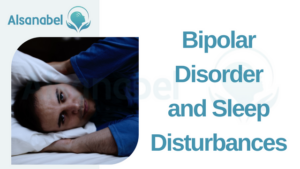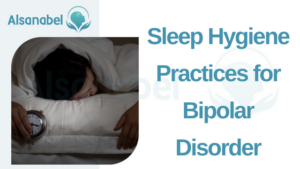The Relationship Between Bipolar Disorder and Sleep 2023
- Category ADHD
Bipolar disorder
Bipolar disorder is a mental health condition characterized by extreme mood swings that range from manic highs to depressive lows. These mood swings can significantly impact various aspects of a person’s life, including their sleep patterns.
Understanding Bipolar Disorder and its impact on sleep
People with bipolar disorder often experience disruptions in their sleep patterns due to the fluctuation between manic and depressive episodes. During manic episodes, individuals may feel extremely energetic and have racing thoughts, making it difficult to fall asleep and maintain a regular sleep schedule. On the other hand, during depressive episodes, individuals may experience excessive sleepiness and find it challenging to wake up and engage in daily activities.
Sleep disturbances can further exacerbate bipolar symptoms. Lack of sleep can trigger manic episodes, leading to increased impulsivity, irritability, and difficulty in managing emotions. Conversely, excessive sleep can worsen depressive episodes, prolonging feelings of sadness, low energy, and lack of motivation.
Recognizing the impact of sleep on bipolar disorder is essential in developing effective treatment strategies. Healthcare professionals may recommend sleep hygiene practices such as maintaining a consistent sleep schedule, creating a relaxing bedtime routine, and avoiding stimulants like caffeine and electronics before bed. In some cases, medications may be prescribed to regulate sleep patterns and stabilize mood.
By prioritizing healthy sleep habits and addressing sleep disturbances, individuals with bipolar disorder can significantly improve their overall well-being and better manage their symptoms. It is important for individuals living with bipolar disorder to consult their healthcare provider to develop personalized strategies that promote quality sleep and facilitate mood stability.
The effect of exercise on bipolar disorder 2023
Bipolar Disorder and Sleep Disturbances
Living with bipolar disorder can be challenging, particularly when it comes to sleep. The relationship between bipolar disorder and sleep is complex and often intertwined. Understanding the common sleep problems associated with bipolar disorder and the role of disrupted sleep in triggering episodes is crucial for effectively managing this mental health condition.

Common sleep problems associated with Bipolar Disorder
People with bipolar disorder frequently experience disruptions in their sleep patterns. These disruptions can manifest in several ways:
- Insomnia:During manic episodes, individuals may find it difficult to fall asleep due to racing thoughts and heightened arousal. They may feel extremely energetic and have a decreased need for sleep, which can lead to insomnia.
- Hypersomnia:Conversely, during depressive episodes, individuals may experience excessive sleepiness and have a hard time staying awake. This excessive sleep can contribute to feelings of fatigue and low energy.
- Irregular sleep patterns:Fluctuations between manic and depressive episodes can disrupt regular sleep schedules, leading to inconsistencies in sleep time and duration.
The role of disrupted sleep in triggering episodes
Disrupted sleep can play a significant role in triggering both manic and depressive episodes in individuals with bipolar disorder. Lack of sleep during manic episodes can exacerbate symptoms of mania, including impulsivity, irritability, and elevated mood. On the other hand, excessive sleep during depressive episodes can worsen feelings of sadness, low energy, and lack of motivation.
The relationship between sleep and bipolar disorder is bidirectional. Sleep disturbances can not only trigger mood episodes, but also be a consequence of these episodes. It is essential to address both the sleep problems and the underlying bipolar symptoms to effectively manage the condition.
By prioritizing healthy sleep habits and incorporating strategies to regulate sleep patterns, individuals with bipolar disorder can experience improvements in both their sleep quality and overall well-being. Seeking guidance from healthcare professionals is crucial in developing personalized strategies that promote healthy sleep and stabilize mood.
Sleep and Bipolar Medications
Managing sleep is crucial for individuals with bipolar disorder, and understanding how medications can affect sleep patterns is essential. While medications used to treat bipolar disorder can help stabilize mood, they can also have an impact on sleep. Here are some common effects of bipolar medications on sleep:
- Sedation:Some medications prescribed for bipolar disorder, such as mood stabilizers or antipsychotics, can cause drowsiness or sedation. This can help individuals with insomnia or hyperactivity during manic episodes to fall asleep.
- Disruptions in sleep architecture:Bipolar medications may alter sleep architecture, which refers to the different stages of sleep. They can affect the duration and quality of REM (rapid eye movement) sleep and slow-wave sleep, leading to changes in sleep patterns.
- Insomnia or hypersomnia:While some medications can induce sedation, others may cause disturbances in sleep, such as insomnia or hypersomnia. It is important to communicate any changes in sleep patterns to healthcare professionals, as adjustments in medication dosage or timing may be necessary.
Tips for managing sleep while on medication
To effectively manage sleep while on bipolar medications, individuals can consider the following tips:
- Stick to a consistent sleep schedule:Establishing a regular sleep routine can help regulate sleep patterns. Go to bed and wake up at the same time every day, even on weekends.
- Create a sleep-friendly environment:Ensure that your sleep environment is comfortable, quiet, and dark. Use earplugs, eye masks, or white noise machines if necessary.
- Avoid stimulants close to bedtime:Stimulants like caffeine or nicotine can interfere with falling asleep. Avoid consuming them in the evening or close to bedtime.
- Practice relaxation techniques:Engaging in relaxation techniques, such as deep breathing exercises, meditation, or progressive muscle relaxation, can help calm the mind and promote better sleep.
- Limit exposure to screens before bed:The blue light emitted by electronic devices can disrupt sleep. Try to limit screen time at least an hour before bedtime.
- Consult healthcare professionals:Discuss any sleep disturbances or concerns with your healthcare team. They can provide guidance on managing sleep while on medication and make necessary adjustments to dosage or timing.
By implementing these strategies and working closely with healthcare professionals, individuals with bipolar disorder can effectively manage their sleep patterns and optimize their overall well-being. Remember, prioritizing sleep is crucial for maintaining stability in bipolar disorder management.
Bipolar Disorder (BD)
Sleep Hygiene Practices for Bipolar Disorder
Individuals with bipolar disorder often face sleep disturbances, which can have a significant impact on their overall well-being. Establishing good sleep hygiene practices is crucial in managing the relationship between bipolar disorder and sleep. Here are some key strategies to create a sleep-friendly environment and establish a regular sleep schedule.

Creating a sleep-friendly environment
- Ensure comfort: Make sure your sleep environment is comfortable and conducive to quality sleep. Use a comfortable mattress and pillows, and choose bedding that suits your preferences.
- Reduce noise and light: Create a quiet and dark environment in the bedroom. Use earplugs, eye masks, or white noise machines to block out any disruptive sounds or light that may interfere with your sleep.
- Temperature control: Maintain a comfortable temperature in your bedroom. Opt for a cooler environment as it tends to promote better sleep.
Establishing a regular sleep schedule
- Set a consistent sleep routine: Going to bed and waking up at the same time every day, even on weekends, helps regulate your sleep-wake cycle. Consistency is key in training your body to recognize sleep cues.
- Wind down before bed: Create a relaxing bedtime routine to signal your body that it’s time to sleep. Engage in calming activities such as reading a book, taking a warm bath, or practicing relaxation techniques like meditation or deep breathing exercises.
- Limit stimulus before bed: Avoid using electronic devices, such as smartphones or laptops, close to bedtime. The blue light emitted by these screens can interfere with the production of melatonin, a hormone that promotes sleep.
By implementing these sleep hygiene practices, individuals with bipolar disorder can improve their sleep patterns and enhance their overall well-being. It is important to consult healthcare professionals to discuss any sleep disturbances and develop a personalized approach to manage bipolar disorder and optimize sleep quality.
Sleep and Bipolar Disorder Management Strategies
Individuals with bipolar disorder often experience sleep disturbances, which can greatly influence their overall well-being and mental health. Establishing effective management strategies for sleep is crucial in maintaining stability and reducing the severity of bipolar symptoms. Here are two key approaches that can significantly improve sleep quality for individuals with bipolar disorder: cognitive-behavioral therapy (CBT) and lifestyle changes.
Cognitive-behavioral therapy for sleep disturbances
Cognitive-behavioral therapy is a widely recognized treatment option for managing sleep disturbances in individuals with bipolar disorder. CBT focuses on identifying and modifying negative thoughts, beliefs, and behaviors that contribute to poor sleep. Through CBT techniques, individuals learn strategies to challenge and change negative thoughts, establish a regular sleep schedule, and develop relaxation techniques to calm the mind before bedtime. CBT can also help individuals manage anxiety and stress, which often contribute to sleep problems.
Lifestyle changes to improve sleep quality
In addition to CBT, certain lifestyle changes can significantly improve sleep quality for individuals with bipolar disorder:
- Establish a regular sleep routine:Going to bed and waking up at the same time every day, even on weekends, helps regulate the body’s internal clock and promotes better sleep.
- Create a sleep-friendly environment:Ensure your bedroom is quiet, dark, and comfortable. Use earplugs, eye masks, or white noise machines to block out any disruptive sounds or light that may interfere with sleep.
- Avoid stimulating activities before bed:Avoid engaging in mentally or physically stimulating activities close to bedtime. This includes avoiding the use of electronic devices that emit the blue light that can disrupt sleep.
- Manage stress:Minimize stress through relaxation techniques such as deep breathing exercises, meditation, or engaging in a calming activity before bed.
By implementing these strategies, individuals with bipolar disorder can effectively manage their sleep and improve their overall well-being. It is important for individuals to consult healthcare professionals to develop a personalized approach that meets their specific needs and supports their bipolar disorder management plan.
The Link Between Sleep and Mood Stability
Individuals with bipolar disorder often face challenges with sleep, which can have a significant impact on their overall well-being and mental health. Establishing effective strategies for managing sleep is crucial in maintaining stability and reducing the severity of bipolar symptoms. Here, we will explore the relationship between sleep and mood stability, as well as strategies for maintaining a stable sleep routine.

The impact of sleep quality on mood regulation
Quality sleep plays a vital role in regulating mood for individuals with bipolar disorder. Sleep disturbances, such as insomnia or hypersomnia, can disrupt the balance between mania and depression, leading to mood swings and exacerbating bipolar symptoms. Research has shown that individuals with bipolar disorder who experience poor sleep are more likely to have more severe manic and depressive episodes.
Furthermore, sleep deprivation can trigger manic episodes and increase irritability and impulsivity. On the other hand, excessive sleep can contribute to depressive symptoms and feelings of fatigue. Achieving a balanced and consistent sleep routine is crucial in maintaining stable moods and preventing mood episodes.
Strategies for maintaining a stable sleep routine
Implementing strategies to promote a stable sleep routine can greatly benefit individuals with bipolar disorder. Here are some important considerations:
- Establish a regular sleep schedule:Going to bed and waking up at the same time every day helps regulate the body’s internal clock and promotes better sleep patterns.
- Create a sleep-friendly environment:Ensure that your bedroom is quiet, dark, and comfortable. Using earplugs, eye masks, or white noise machines can help block out any disruptive sounds or light that may interfere with sleep.
- Avoid stimulating activities before bed:Engaging in mentally or physically stimulating activities close to bedtime should be avoided. This includes limiting the use of electronic devices that emit blue light, as it can disrupt sleep.
- Manage stress:Stress can greatly impact sleep quality. Incorporating relaxation techniques such as deep breathing exercises, meditation, or engaging in a calming activity before bed can help reduce stress levels.
Conclusion
The link between sleep and mood stability in individuals with bipolar disorder is undeniable. Poor sleep quality can greatly impact their overall well-being and mental health. By establishing effective strategies for managing sleep, individuals can experience greater stability and reduce the severity of bipolar symptoms.
Recognizing the importance of addressing sleep in Bipolar Disorder treatment
Quality sleep plays a vital role in regulating mood for individuals with bipolar disorder. Sleep disturbances, such as insomnia or hypersomnia, can disrupt the delicate balance between mania and depression, leading to mood swings and exacerbating bipolar symptoms. Research has shown that individuals with bipolar disorder who experience poor sleep are more likely to have more severe manic and depressive episodes. In fact, sleep deprivation can trigger manic episodes and increase irritability and impulsivity, while excessive sleep can contribute to depressive symptoms and fatigue. Therefore, it is crucial to prioritize sleep and incorporate strategies to maintain a stable sleep routine.
Importance of consulting healthcare professionals for individualized care
Implementing strategies to promote a stable sleep routine can greatly benefit individuals with bipolar disorder. However, it is essential to consult healthcare professionals who specialize in treating bipolar disorder. They can provide personalized advice and guidance tailored to an individual’s specific needs and symptoms. Healthcare professionals can also help develop a comprehensive management plan that includes medication, therapy, and lifestyle adjustments to support overall mental health and stability.
By recognizing the importance of addressing sleep and seeking professional guidance, individuals with bipolar disorder can enhance their well-being and improve their quality of life. Establishing a stable sleep routine and managing sleep disruptions are critical components of effectively managing bipolar disorder and achieving mood stability.









